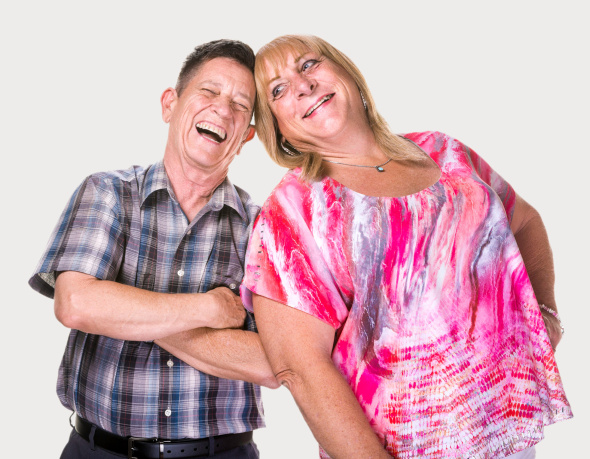LGBT seniors: avoiding a return to the closet
Experts agree : people from the LGBT community need above all not to be judged. If the physician and staff use inclusive language and adopt a positive attitude, LGBT seniors will feel reassured and a relationship of trust can develop.
However, two particular aspects seem to stand out: first, discrimination against these seniors sometimes affects their mental health, and second, surgery and hormone treatments related to a gender expression process can have long-term consequences.
Mental Health
The Fondation Émergence's mission is to educate, inform and raise awareness about the realities of LGBT people. Its spokesperson, Julien Rougerie, head of the program Pour que vieillir soit gai (For Aging to be Gay), believes that we must be aware of the social issues experienced by LGBT seniors.

For most of their lives, they have been called perverts, accused of committing a sin and charged with a criminal act. They have learned to keep quiet, to hide their identity. Even though laws have since been passed, it is a defense mechanism that is difficult to undo.
Julien Rougerie, head of the program Pour que vieillir soit gai at Fondation Émergence
Experiencing rejection has an impact
Living with rejection in one's family, at work and in public places inevitably has its after-effects, not to mention the fact that family members sometimes maintain prejudices despite the laws (see box "Five decisive dates"). As a result, LGBT seniors suffer the consequences of social isolation more than other seniors, because this isolation, which affects their mental health, has, in some cases, lasted their entire lives.
President of the Association des médecins psychiatres du Québec and co-founder of the McGill University Sexual Identity Centre, Dr. Karine J. Igartua points out that these seniors, witnesses and victims of homophobic insults, discrimination and sometimes even violence at a young age, have internalized the contemptuous attitudes of their persecutors, which can lead to symptoms of depression or anxiety.
Society has certainly evolved; homophobia is less acceptable and less intense than in the past. However, when it is present, it is devious because it is less apparent. Even in the absence of danger, it is difficult to trust when you have spent so many years in hiding to protect yourself. And we become vulnerable again as we get older, so much that when entering a CHSLD, some LGBT seniors choose to "go back in the closet" for fear of being victims of homophobia from caregivers.
Dr. Igartua points out that the situation is even worse for trans seniors than for gay seniors because society is not as tolerant of them. In addition, the old standards of care made the transition extremely painful, requiring the person to cross-dress for two years before accessing hormone treatments and surgery, which has left its mark.

People from the LGBT community do not want to be solely defined by their sexuality. Nevertheless, when a transgender man or woman discloses a journey that has included hormone treatment or surgery, physicians, especially endocrinologists, gynecologists and urologists, need to be aware of and sensitive to the social and medical issues involved.
Line Chamberland, holder of the Research Chair on Homophobia and professor in the Department of Sexology at the Université du Québec à Montréal (UQAM), points out that there are medical issues related to body transformations.
Hormonal treatments induce physical changes that are in harmony with gender identity. Masculinizing hormone therapy consists of testosterone treatment. For feminizing hormone therapy, anti-androgens, estrogen or progesterone are used; the choice of treatment is made according to the physician's recommendations and the patient's preferences," says Dr. Jean Palardy, President of the Association des médecins endocrinologues du Québec.
Transgender people who opt for hormone therapy will have to undergo it for their lifetime. Although hormone therapy has been used on many people for a long time, its long-term effects on the transgender population have not yet been well studied, so some side effects need to be monitored.
Testosterone can cause acne, baldness, weight gain, increased red blood cell count, increased cholesterol and liver enzymes. It may also contribute to the development of hypertension, type 2 diabetes and cardiovascular diseases.
Feminizing hormones can increase the risk of blood clots. They can sometimes cause an increase in liver enzymes and contribute to weight gain or an increase in cholesterol levels, most of the time good cholesterol. Currently, the risk of cardiovascular diseases is the subject of controversy.
A delicate issue to address
Studies show that LGBT seniors consult the health care system less than other seniors because they avoid situations where they will have to explain themselves. Given their life experience, they are often reluctant to discuss the sensitive issue of their sexual identity.
How can physicians reassure this clientele? Julie Beauchamp, the first PhD holder in sexology at UQAM and coordinator of the field of expertise Inclusive Aging, Diversity, Health and Well-being at the Centre de recherche et d'expertise en gérontologie sociale of the CIUSSS of the Centre-Ouest-de-l'Île-de-Montréal, suggests, among other things, making the environment inclusive.
Posters, pamphlets and specialized magazines on sexual diversity and gender plurality, whether in the doctor's waiting room, in the hospital, in CLSCs or in CHSLDs, help to show the openness of the doctor and staff.
LGBT seniors are sometimes at odds with their families of origin. Therefore, it is beneficial that doctors simply talk about loved ones or significant people, instead of asking them if a spouse or family member can accompany them for their treatments, whether it be radiotherapy, chemotherapy or ophthalmology, for example. They can also refer their clients to resources in their area that offer support to LGBT seniors.
Five key dates
1969 | Canada decriminalized homosexuality in private, between consenting adults
1990 | the World Health Organization removes homosexuality from the list of mental illnesses
1996 | the Canadian Human Rights Act added sexual orientation to the list of prohibited grounds of discrimination
2005 | The Civil Marriage Act makes Canada the fourth country to allow same-sex marriage
2017 | Canadian Human Rights Act adds gender identity and gender expression to the list of prohibited grounds of discrimination
